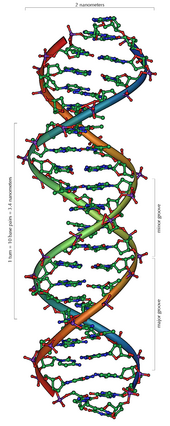Molecular biology
The molecular biology is the study of the structure and function of biological macromolecules, is concerned as such with the structure, biosynthesis and function of DNA and RNA at the molecular level and examined how these with each other and proteins interact. The research area of molecular biology overlaps more and more with other fields of biology and chemistry , in particular (molecular) genetics and biochemistry . The boundaries between these specialist areas are often fluid. The name for this subject was already used in the 1930s, but it was not until 1952 that the English physicist and molecular biologist William Astbury coined it decisively.
Fields of work
Important fields of work are research into gene expression and gene regulation at all levels ( epigenetics , transcription , translation ) and research into the function of proteins in the cell. In particular, the interaction between DNA and proteins in the cell is a main focus. This is intended to improve the basic understanding of the processes in a cell.
The data obtained can in turn be used in a large number of other fields. For example, with the help of molecular biological data it is possible to better understand diseases and to improve the precise mode of action and development of drugs . The elucidation of the genetic information by sequencing the DNA and RNA enables essential insights into the evolution of living things . In many cases, the family trees of the system of living beings developed on the basis of morphological and fossil-based systems are confirmed or refuted by sequence data. After all, genetic engineering makes it possible to change the genetic makeup of organisms . For example, hormones and other endogenous substances in humans, but also other new drugs ( biotechnology ) can be produced in bacteria or farm animals . The gene therapy is concerned with the correction of disease-causing genetic defects and discharged via special methods proper gene sequences (vectors) to replace defective sections in the DNA one. In the field of plant breeding, genetic engineering is already being used to smuggle in genes for disease resistance or defense mechanisms against predators or competing plants, so that, among other things, the corresponding substances are formed by the plants themselves.
Molecular biological research institutes in German-speaking countries that deal with this include the European Molecular Biology Laboratory , various Max Planck Institutes and the German Cancer Research Center .
techniques
Molecular biological methods are used in modern biological and medical research, but have also found their way into forensics and many other areas of daily life. Molecular biology uses a variety of biochemical , microbiological , genetic and genetic engineering processes and combines their results in order to obtain a larger context. Here, too, the range of techniques is fluid and extends from in-vitro technology to in-vivo analysis, such as PCR , cloning , mutagenesis , recombinant expression , yeast two-hybrid systems , cell culture , etc.
See also
literature
- Bruce Alberts , et al. a .: Molecular biology of the cell . 4th edition. Wiley-VCH., Weinheim 2003, ISBN 3-527-30492-4 .
- David P. Clark: Molecular Biology: The Original with Translation Aids . Spektrum Akademischer Verlag., Heidelberg 2006, ISBN 3-8274-1696-5 .
- A. Henco: International Biotechnology Economics and Policy . Authors Online. 2007, ISBN 978-0-7552-0293-5 .
- Lily E. Kay: The Molecular Vision of Life: Caltech, the Rockefeller Foundation, and the Rise of the New Biology . Oxford University Press., Reprint 1996, ISBN 0-19-511143-5 .
- Michel Morange: A History of Molecular Biology . MA: Harvard University Press, Cambridge, New Edition 2000, ISBN 0-674-00169-9 .
- Cornel Mülhardt: The Experimenter: Molecular Biology / Genomics . 5th edition. Spektrum Akademischer Verlag., Heidelberg 2006, ISBN 3-8274-1714-7 .
- Hans-Jörg Rheinberger : Molecular Biology. In: Werner E. Gerabek , Bernhard D. Haage, Gundolf Keil , Wolfgang Wegner (eds.): Enzyklopädie Medizingeschichte. De Gruyter, Berlin / New York 2005, ISBN 3-11-015714-4 , p. 1001 f.
- Sven P. Thoms: Origin of Life . Fischer Verlag., Frankfurt 2005, ISBN 3-596-16128-2 .
Web links
- Lindley Darden and James Tabery: Molecular Biology. In: Edward N. Zalta (Ed.): Stanford Encyclopedia of Philosophy .
- Ken Waters: Molecular Genetics. In: Edward N. Zalta (Ed.): Stanford Encyclopedia of Philosophy .
- Society for Biochemistry and Molecular Biology
- Current information on reporter gene research
Individual evidence
- ↑ Alexander McLennan, Andy Bates: Molecular biology: for biologists, biochemists, pharmacists and physicians . John Wiley & Sons, 2013, ISBN 978-3-527-33476-6 , pp. 257 ( limited preview in Google Book Search [accessed April 5, 2017]).
